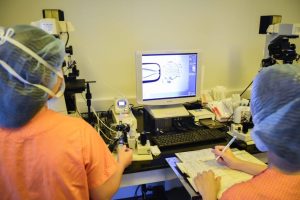The field of reproductive science has made significant strides in recent decades, thanks to the pioneering efforts of research programs dedicated to understanding the complexities of human reproduction. One such program that has made remarkable contributions to this field is the Reproductive Biology Research Program. This initiative, driven by a passion for unraveling the mysteries of human fertility and reproductive health, has played a pivotal role in advancing knowledge, developing innovative technologies, and improving the lives of countless individuals worldwide.
Establishment and Mission
The Reproductive Biology Research Program was founded with a primary mission to address the diverse challenges associated with human reproduction, fertility, and reproductive health. The program’s inception was marked by a collaboration between esteemed scientists, medical professionals, and philanthropists who recognized the need for comprehensive research in this critical area of medicine. The program’s ultimate goal was to enhance our understanding of human reproduction and develop advanced diagnostic and treatment options.

Key Focus Areas
The program’s research agenda encompasses a wide array of focus areas, including:
Infertility – The program has dedicated substantial resources to investigating the causes of infertility in both men and women. Researchers within the program have conducted groundbreaking studies on factors such as hormonal imbalances, structural abnormalities, genetic predispositions, and lifestyle choices that can impact fertility.
Assisted Reproductive Technologies ART – The Reproductive Biology Research Program has been at the forefront of developing and improving ART procedures such as in vitro fertilization IVF and intracytoplasmic sperm injection ICSI. Their work has resulted in increased success rates, reduced risks, and more accessible options for couples struggling to conceive and click here.
Reproductive Endocrinology – The program also conducts research into reproductive endocrinology, focusing on hormones and their influence on the reproductive system. This research has led to the development of hormone-based therapies and treatments for various reproductive health issues.
Genetics and Reproduction – A significant aspect of the program’s work involves exploring the genetic factors that can impact fertility and reproduction. Their research has contributed to the understanding of genetic disorders related to reproduction and the development of pre-implantation genetic testing.
Innovations and Breakthroughs
The Reproductive Biology Research Program has made several groundbreaking innovations that have reshaped the landscape of reproductive science:
Ovarian Tissue Cryopreservation – The program’s research led to the development of improved methods for freezing and preserving ovarian tissue. This breakthrough has given hope to cancer patients, allowing them to preserve their fertility before undergoing potentially sterilizing treatments like chemotherapy.
Sperm Sorting Techniques – The program developed advanced sperm sorting techniques, enhancing the selection of healthy and motile sperm for ART procedures. This has significantly improved the chances of successful fertilization.
Non-Invasive Fertility Assessment – The program pioneered non-invasive methods for assessing fertility in both men and women, reducing the need for invasive diagnostic procedures.
The Reproductive Biology Research Program’s impact extends beyond the laboratory. Its research findings and innovations have been disseminated worldwide, benefiting countless individuals seeking to build their families. Moreover, the program collaborates with healthcare providers, educational institutions, and international organizations, ensuring that their findings are put into practice to help those struggling with reproductive health issues.



